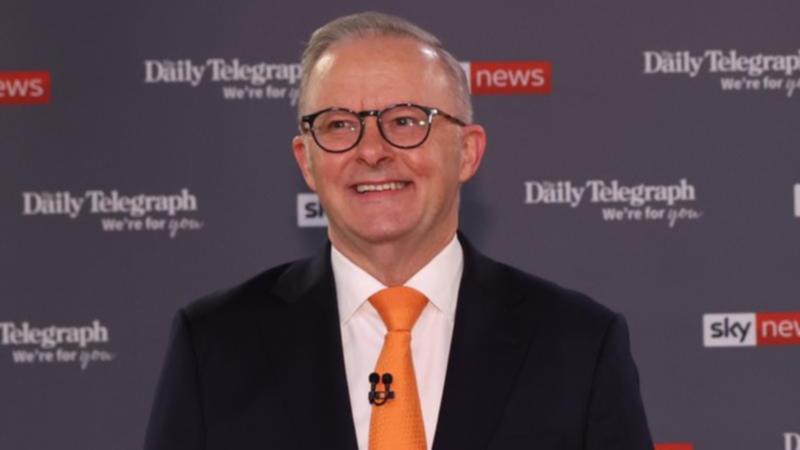Anthony Albanese ‘confident’ in future of Aukus amid reports of bigger role for Elon Musk
Anthony Albanese says $368b Aukus pact remains solid amid reports Elon Musk has been tasked with improving US capability to build the nuclear-powered submarines.

Prime Minister Anthony Albanese has said he remains “confident” about the future of the $368b Aukus pact amid reports that tech tycoon Elon Musk has been tasked with improving US capability to build the program’s nuclear-powered submarines.
On Friday, former Ambassador to Washington Arthur Sinodinos said Mr Musk, who runs the Department of Government Efficiency (DOGE), was becoming more involved in the Aukus arrangement between the US, Australia and the UK, and could play a “big role.”
Mr Sinodinos told Nine’s Today program there was still support in Congress for Aukus, but added that Mr Musk was becoming involved in determining “how they can streamline and better produce the submarines.”
Sign up to The Nightly's newsletters.
Get the first look at the digital newspaper, curated daily stories and breaking headlines delivered to your inbox.
By continuing you agree to our Terms and Privacy Policy.He added: “And so Musk [will have a] big role potentially. Let’s see if we can get him to Australia to have a look at the shipyards and tell us what he thinks.”
Asked repeatedly at a press conference in Darwin if this would alter Australia’s approach to the nuclear-powered submarine and security pact, Mr Albanese said the arrangement would remain unchanged.
“I’m confident about Aukus because I’ve had those firsthand discussions with the president the United States and also with more than 100 members of Congress and the Senate during my state visit to the United States,” says Mr Albanese.
“I’m also confident that people, when they make an assessment, know that this is in Australia’s national interest, but it’s also in the national interest of the United States,” he adds.
The AUKUS security partnership, first unveiled in September 2021, aims to deliver a nuclear-powered submarine capability for Australia with the help of the US and the UK, as well as boosting trilateral defence cooperation on cyber and artificial intelligence and other cutting-edge technologies.
Under the deal, Australia will acquire three Virginia-class submarines from the US and build five new nuclear-powered attack submarines.
The first stage of so-called “Pillar 1” would see British and American nuclear submarines rotating through Perth from 2027 before the sale of US Navy Virginia-class attack submarines to Australia in the early 2030s.
In the latter stage, Australia will construct a new SSN-Aukus fleet in Adelaide.
But the global instability triggered by US President Donald Trump’s shake-up of the international trade order has stoked fresh calls for Australia to rethink its involvement in the multi-billion dollar defence initiative.
Independent MP for Goldstein, Zoe Daniel, has called for a formal review of Australia’s Aukus commitment, citing serious concerns about cost, delivery risks, and growing uncertainty over the United States’ reliability as a defence partner.
“Strategic autonomy isn’t just about submarines. It’s about having choices. Right now, Australia has only one plan – and it’s Aukus. That’s not good enough,” Ms Daniel said.
Concerns have also been raised in Washington of the indirect impact of the new trade tariff regime, particularly the blanket 25 per cent rate for steel and aluminium imports, on the timeline for the program.
Senior Democrat Senator Tim Kaine, who is on the Senate Armed Services Committee, pointed out this week that 35 per cent of the steel and aluminium that went into ships and submarines came from partners such as Canada and the UK, reported the Age.
“We are already having trouble getting these ships and subs on time [and] on budget. Increase those prices – it’s going to be a problem,” Mr Kaine said at an Aukus event in Washington on Wednesday night.
A decision by the British Parliament’s Defence Committee to launch an inquiry into the trilateral security partnership has also raised pressure on Labor to do a similar review.
The British inquiry was launched on April 2 to do a stocktake of both pillars of the program and will take submissions until May 30.
“AUKUS has been underway for over three years now. Our inquiry, launching today, will examine whether the partnership is on track, and will consider the impact of geopolitical shifts since the initial agreement in 2021,” said a committee statement.
“The inquiry will examine the progress made against each of the two pillars, and ask how any challenges could be addressed.”
So far, Labor has not caved to demands to conduct its own parliamentary investigation.
“We support the existing arrangements we have with the United States,” Mr Albanese said on Friday.

